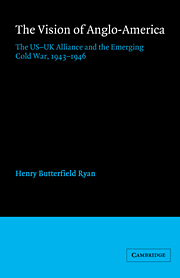Summary
Nine months after Winston Churchill stepped down as Great Britain's Prime Minister, he made the strongest call he had ever made for establishment of an Anglo-American coalition. Invited by President Truman to speak at Westminster College in Fulton, Missouri, Churchill said:
Neither the sure prevention of war, nor the continuous rise of world organisation will be gained without what I have called the fraternal association of the English speaking peoples. This means a special relationship between the British Commonwealth and Empire and the United States of America. Fraternal Association requires… the continuance of the present facilities for mutual security… This would perhaps double the mobility of the American Navy and Air Force. It would greatly expand that of the British Empire forces and it might well lead, if and as the world calms down, to important financial savings… Eventually there may come, I feel eventually there will come, the principle of common citizenship, but that we may be content to leave to destiny, whose outstretched arm so many of us can already clearly see.
Several months before that momentous speech Churchill had made similar remarks in the House of Commons and was to make them again in New York City a few days after it. Nevertheless, it was the talk at Fulton, known since as the ‘Iron Curtain’ speech, that drew worldwide attention.
Churchill's influence in the United States was enormous, greater than that of any other political figure after Roosevelt passed from the scene.
- Type
- Chapter
- Information
- The Vision of Anglo-AmericaThe US-UK Alliance and the Emerging Cold War, 1943–1946, pp. 170 - 173Publisher: Cambridge University PressPrint publication year: 1987



